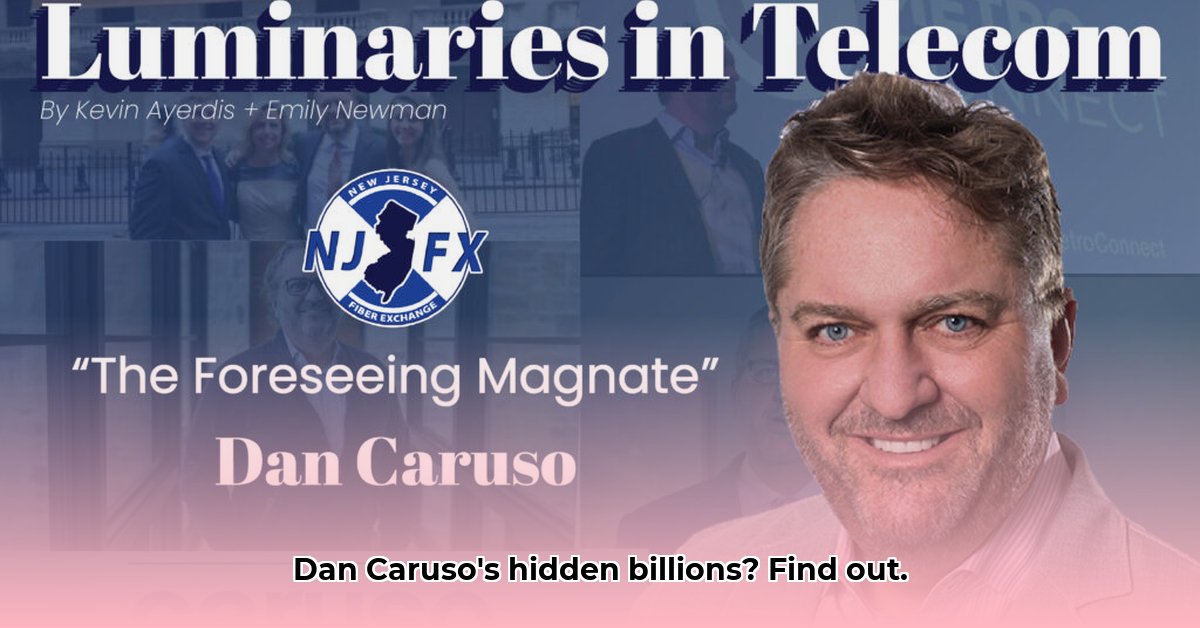
Unraveling the Financial Enigma of Dan Caruso
Dan Caruso, the visionary behind Zayo Group Holdings' remarkable success in the fiber-optic industry, is a figure whose personal wealth has generated considerable speculation. Estimates of his net worth range dramatically—from a comparatively modest $74.6 million to a staggering $1.5 billion. This significant discrepancy necessitates a detailed exploration of the factors contributing to this uncertainty. For more information on his wealth, see Caruso's Net Worth.
Zayo's Ascent and Caruso's Fortune
Zayo Group Holdings' meteoric rise under Caruso's leadership is undeniable. Its transformation into a major player in the high-speed internet infrastructure market strongly suggests a substantial personal fortune for its founder. This success provides a strong foundation, though not a precise quantification, for the higher net worth estimates. But how do we bridge the gap between perceived wealth and verifiable figures?
Deconstructing the Discrepancy: $1.5 Billion vs. $74.6 Million
The massive disparity between the reported net worth figures requires a systematic analysis. What accounts for this difference?
SEC Filings: A Limited Perspective
The lower estimate, approximately $74.6 million, stems from publicly available SEC filings. However, these reports only reflect publicly traded assets, predominantly Zayo Group Holdings stock. This is a significant limitation; it omits a vast array of assets that typically contribute substantially to the overall net worth of high-net-worth individuals. Private investments, real estate, and other undisclosed holdings remain unaccounted for in these filings.
The $1.5 Billion Estimate: Methodology and Uncertainty
The significantly higher $1.5 billion estimate incorporates a broader range of assets, including those not captured by SEC filings. This likely includes privately held investments, real estate portfolios, and potentially other income streams not subject to public disclosure. Nevertheless, this higher figure remains inherently speculative. The methodologies used to arrive at this estimation are not always transparent, introducing several considerable uncertainties. The very nature of privately held assets makes precise valuation particularly challenging, leading to potential biases.
Methodological Challenges: The Limitations of Net Worth Estimation
Accurately assessing the net worth of high-profile individuals with intricate financial holdings presents significant challenges. Several factors contribute to this complexity:
The Invisibility of Private Investments: A substantial portion of Caruso’s wealth is likely tied up in private equity investments or other private ventures, whose values are not publicly disclosed and are subject to market fluctuations.
The Hidden Value of Real Estate: Significant real estate holdings, including both residential and commercial properties, are rarely disclosed in full detail, making accurate valuation difficult.
Undetectable Income Streams: Numerous income streams, such as consulting fees, speaking engagements, or other entrepreneurial endeavors, may not be captured in public records.
Reconciling the Discrepancy: A Range of Possibilities
The substantial difference between the reported figures underscores the inherent difficulty in precisely determining the net worth of ultra-high-net-worth individuals. While Caruso's entrepreneurial success undeniably generated considerable wealth, pinpointing the precise amount remains elusive. The SEC filings offer a minimum value, while the $1.5 billion estimate suggests a significantly higher potential. The reality, however, likely falls somewhere within this wide spectrum. The lack of comprehensive public disclosure of private assets remains a critical impediment to achieving a definite figure.
The Imperative for Transparency
The discrepancies in reported net worth figures highlight the need for increased transparency in financial reporting, particularly regarding privately held assets. Greater transparency is crucial for fostering investor confidence and ensuring appropriate regulatory oversight. Improvements in financial reporting standards and more robust valuation methodologies are needed to improve the accuracy of net worth estimations, moving beyond the current reliance on speculation and partial data. For now, a range of plausible values remains more accurate than the pursuit of a single definitive figure.